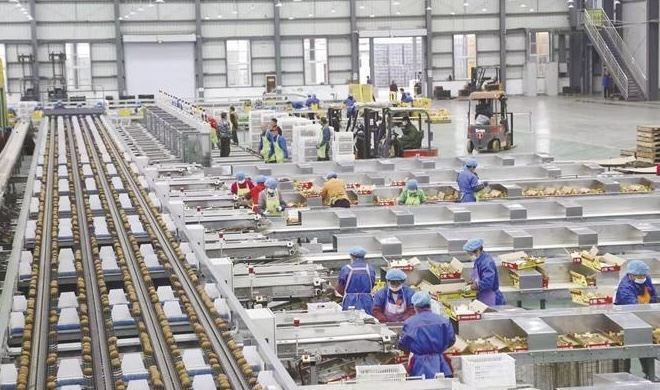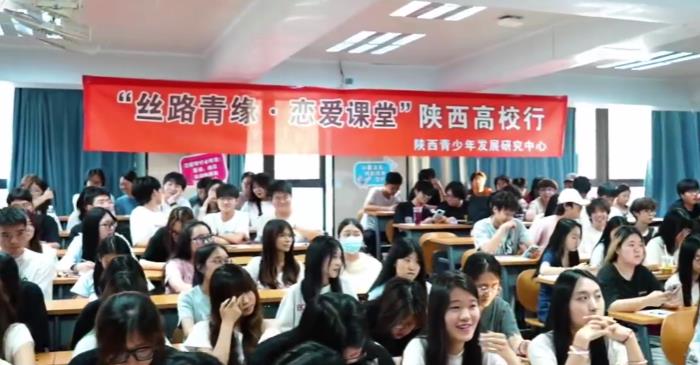新格局迎来新机遇,外资持续看好中国市场 Innovation drives MNCs in nation
来源:中国日报网
日期:2022-06-28 14:41:45
面对新冠肺炎疫情和错综复杂的国际环境,中国不断优化营商环境,为跨国公司在华发展提供了重要动力。多家跨国公司总裁表示,中国经济潜力巨大,前景光明,疫情不会改变他们在华发展的信心和决心。
Employees of Fujifilm present a device with a three-dimensional imaging technology at the 4th China International Import Expo in Shanghai on Nov 9. [Photo provided to China Daily]
There was a time, not too long ago, when all that multinational corporations had to do to succeed in China was employ a simple, time-tested formula: Bring in bestselling products, popularize them, make profits, build local factories, expand or enhance the product portfolio, throw in some value-added services, and, maybe, even hire local CEOs, in order to reach more consumers in lower-tier cities.
不久之前,跨国公司要想在中国取得成功,唯一需要做的就是采用一个简单、久经考验的公式:引进畅销产品,推广普及,盈利,在当地建厂,扩大或完善产品组合,投入一些增值服务,甚至可能雇佣当地首席执行官,以便获得二线城市的更多消费者。
Well, MNCs now realize that formula will no longer suffice, experts said. So, MNCs ranging from established manufacturers to renowned energy giants are altering their China strategies with newfound zeal.
专家表示,跨国公司现在意识到,这个公式已经不够用了。因此,从老牌制造商到知名能源巨头,跨国公司都在以全新的热情改变其在华战略。
For instance, by the end of May, as many as 848 MNCs had their regional headquarters set up in Shanghai. Despite recent COVID lockdowns, the megacity remains the proud home to 512 foreign-funded research and development centers, the Shanghai Municipal Commission of Commerce said.
例如,截至5月底,多达848家跨国公司在上海设立了地区总部。上海市商务委员会表示,尽管因新冠疫情上海最近经历了封控,但仍有512家外资研发中心在这座超大城市落户。
Reasons abound for MNCs' focus on China, experts said. For one, China is the world's second-largest economy (GDP: $17.7 trillion at the annual average exchange rate in 2021). For another, it is humongous in terms of sheer geographical spread and population.
专家表示,跨国公司关注中国的原因很多。首先,中国是世界第二大经济体(按2021的年平均汇率计算,GDP为17.7万亿美元)。另一方面,中国地理分布广和人口庞大。
Add to that factors like rising disposable incomes that stoke consumption upgrade, huge demographic segments of consumers, future growth prospects, economic resilience amid the COVID-19 pandemic and game-changing multilateral, regional and bilateral trade agreements, and it becomes easy to understand why MNCs are furiously developing China-specific strategies, experts said.
再加上推动消费升级的可支配收入增加、庞大的消费者群体、未来的增长前景、疫情中显现出的经济韧性以及重要的多边、区域和双边贸易协定,很容易理解跨国公司为何热衷制定中国战略。
The current COVID-induced downward pressure and disruptions to industrial and supply chains notwithstanding, China has been trying to make the most of the brightening dynamic in its market.
尽管当前疫情引发了下行压力,并扰乱了产业链和供应链,但中国一直在努力充分利用其市场的光明活力。
For instance, over and above reforms and higher-level opening-up, there are proactive consultations with business leaders; thrust on high-tech, innovation and digitalization; efforts to reform the World Trade Organization for a just and fair multilateral trading system; and a host of other fiscal and monetary tweaks from time to time——all to ensure MNCs receive a level playing field in China.
例如,除了推进更深层次改革、更高水平开放外,还与企业领导人进行了积极的协商;推动高科技、创新和数字化;推动世界贸易组织改革,形成更加公正合理的多边贸易体制;以及进行一系列其他财政和货币政策调整,所有这些都是为了确保跨国公司在中国获得一个公平的竞争环境。
Denis Depoux, managing director of Roland Berger, a global consultancy, said China will remain an attractive market, a superior industrial cluster and an increasingly efficient innovation hub for most MNCs.
全球咨询公司罗兰贝格总经理丹尼斯·德普克斯表示,对于大多数跨国公司来说,中国仍是一个颇具吸引力的市场、优越的产业集群和日益高效的创新中心。
What is more, the China market increasingly demonstrates distinct characteristics, particularly in consumption patterns, technology and evolution of business formats.
此外,中国市场日益显示出鲜明的特点,尤其是在消费模式、技术和商业模式的演变方面。
In response, MNCs in China are betting big on localization, engagement with various stakeholders, increased investments and emerging business models, Depoux said.
德普克斯表示,因此在华跨国公司正大力押注于本地化、与各利益相关者的接触、增加投资和创新商业模式。
Agreed Nathan Stoner, vice-president of the United States-based power solutions provider Cummins Inc and chairman of Cummins China. Stoner said Cummins' presence in China is critical to the company's growth globally. China continues to be the largest end-market by volume in many of its application markets, and one of the fastest developing markets for new energy like hydrogen.
美国康明斯公司副总裁、康明斯中国董事长纳森·斯通纳认可这一观点。斯通纳表示,康明斯在中国的业务对该公司的全球增长至关重要。中国仍然是其多个应用市场中体量最大的终端市场,也是氢等新能源发展最快的市场之一。
"More recently, we have been following the focus on the promotion of technological innovation, environmental sustainability, and closer cross-border collaboration," Stoner said. "We will start operations at our expanded East Asia R&D center in Wuhan, Hubei province, in the third quarter of this year, with $150 million investment to incubate new technologies."
斯通纳称:“最近,我们一直关注促进技术创新、环境可持续性和更密切的跨境合作。我们在湖北省武汉市扩大的东亚研发中心将于今年第三季度开始运营,投资1.5亿美元孵化新技术。”
Cummins is building its China headquarters for new power business in Shanghai. Upon completion, it will house a hydrogen technical center and fuel cell assembly operations.
康明斯正在上海为新的电力业务建设其中国总部,建成后,将拥有一个氢技术中心和燃料电池组装作业线。
It is not just certain MNCs that are sanguine about China. Data confirm a broader trend. For instance, in the first five months of this year, foreign direct investment flowing into the Chinese mainland, in actual use, expanded 17.3 percent year-on-year to 564.2 billion yuan ($84.04 billion), data from the Ministry of Commerce showed.
不仅仅是某些跨国公司对中国市场感到乐观。数据说明了宏观趋势。例如,商务部数据显示,今年前五个月,流入中国大陆的实际使用外商直接投资同比增长17.3%,达到5642亿元人民币。
In the services sector alone, foreign capital in actual use grew by 10.8 percent year-on-year to 423.3 billion yuan in the January-May period. High-tech industries, high-tech manufacturing and high-tech services grew by 42.7 percent, 32.9 percent and 45.4 percent, respectively.
1-5月,仅服务业实际使用外资4233亿元,同比增长10.8%。高科技产业、高科技制造业和高科技服务业分别增长42.7%、32.9%和45.4%。
Investment from the Republic of Korea, the US and Germany climbed by 52.8 percent, 27.1 percent and 21.4 percent, respectively.
韩国、美国和德国的投资分别增长了52.8%、27.1%和21.4%。
Sheng Qiuping, vice-minister of commerce, said the Chinese market will remain open and unleash more opportunities for global companies, as the fundamentals of the Chinese economy will continue to improve.
商务部副部长盛秋平表示,我国经济发展基本面持续向好,开放的中国大市场,必将为各国企业发展提供更多机遇。
China will reinforce the role of fair competition to support the growth of a unified domestic market to further integrate its economy globally and expand high-level opening-up, he said.
他表示,中国将强调公平竞争原则,支持建设全国统一大市场,促进国内市场与国际市场更好联通接轨、实现高水平对外开放。
Earlier this year, China fully implemented the negative list for foreign investment, expanded the encouraged investment catalog, improved services for investment promotion, and added more cities to the pilot program of opening the services sector.
今年早些时候,中国全面实施外资准入负面清单,扩大鼓励外商投资产业目录,健全外商投资和促进服务体系,并新增服务业扩大开放综合试点。
In April, the Communist Party of China Central Committee and the State Council, China's Cabinet, jointly released a guideline on accelerating the establishment of a unified domestic market that is highly efficient, rule-based, fair for competition and open.
《中共中央、国务院关于加快建设全国统一大市场的意见》于2022年4月发布。
The guideline includes plans covering six areas like market regulation and supervision, and measures against unfair competition and market intervention.
《意见》从六个方面明确了加快建设全国统一大市场的重点任务,包括市场监管、反不正当竞争和市场干预措施等。
That China's approach has been effective is borne out by Tesla Inc's Shanghai factory, which started production in just 12 months, said Sherri He, managing director for China of Kearney, a US-based management consulting firm.
美国管理咨询公司科尔尼大中华区总裁贺晓青表示,特斯拉上海工厂证明中国的做法是行之有效的,该工厂仅在12个月内就开始生产。
Tesla's China plant produced over 484,000 vehicles in Shanghai in 2021, accounting for 52 percent of its global sales. Some 160,000 of these vehicles were exported, showing that much of the production met local demand, she said.
2021,特斯拉在中国上海的工厂生产了48.4万辆汽车,占其全球销量的52%。贺晓青称,其中约有16万辆出口,表明大部分生产满足了当地需求。
Although China's cost competitiveness in labor has gradually declined, there are many other areas where the country has improved its competitiveness, she said. For example, its middle-income group is growing. Domestic demand is burgeoning. Higher value-added industries now boast technology-backed supply chains.
贺晓青称,尽管中国在劳动力成本方面的竞争力逐渐下降,但在许多其他领域,中国的竞争力有所提高。例如,中国的中等收入群体正在增长,国内需求正在增长。如今,高附加值行业拥有技术支持的供应链。
Concurred Greg Holman, president for China unit of Stryker Corp, a US-based medical technology provider. "Even though the COVID-19 pandemic has presented temporary challenges, they do not change our commitment to China. We will open our China Innovation Center in Shanghai next year."
美国医疗技术提供商史赛克中国分公司总裁格雷格·霍尔曼表示赞同。“尽管疫情带来了暂时的挑战,但这并没有改变我们对中国的承诺。明年我们将在上海开设中国创新中心。”




 陕公网安备61010302000471号
陕公网安备61010302000471号



